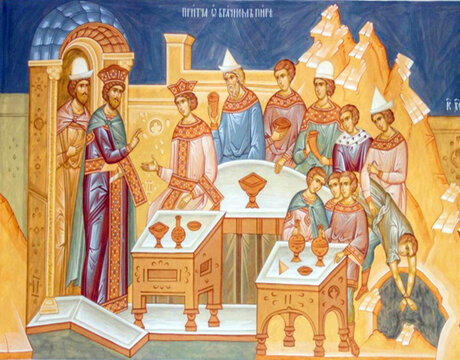Divine Retreat Centre UK – Official Website

Peter Declares That Jesus Is the Messiah
December 24, 2020
Have you bound God?
January 22, 2021Parable of the Wedding Banquet
In this parable, Jesus compares the kingdom of heaven to a wedding banquet, where the King symbolises God, the servants symbolise the prophets, and the invited guests symbolise us.
BANQUETS IN THE OLD TESTAMENT
Throughout the Bible there are many banquets, and each time, something is sacrificed and offered to God. But where did the idea of sacrifice come from? In the Garden of Eden after the fall of man, God sacrificed a lamb and gave its skin to Adam and Eve so they could cover themselves. ‘And the Lord God made garments of skins for the man and for his wife, and clothed them.’ (Genesis 3:21) Then we see Cain and Abel offering sacrifices to God. Abel’s offering was accepted but Cain’s was not, because Abel gave his best whereas Cain did not. Here you can see the idea of a banquet where humans give their best to God, but if it’s done without proper disposition, it’s not accepted.
After the flood, Noah offered a sacrifice of thanksgiving, then God made a covenant with him. ‘Then Noah built an altar to the Lord, and took of every clean animal and of every clean bird, and offered burnt offerings on the altar…Then God said to Noah and to his sons with him, “As for me, I am establishing my covenant with you and your descendants after you.”’ (Genesis 8:20, 9:8-9) When God promised Abraham that his descendants would be as numerous as the stars, and that he would possess the land of Canaan (the promised land), Abraham said, “O Lord God, how am I to know that I shall possess it?” (Genesis 15:8) So Abraham was asked to offer an animal sacrifice, then God made a covenant with him. The covenant was sealed by the sacrifice, and this is the banquet that human beings host, then God accepts our invitation by making a covenant with us.
THE STORY OF ABRAHAM AND ISAAC
God said to Abraham, “Take your son, your only son Isaac, whom you love, and go to the land of Moriah, and offer him there as a burnt offering on one of the mountains that I shall show you.” (Genesis 22:2) Abraham had faith in God, so he obeyed. Just as he was about to offer up his only son, God interfered and stopped him, providing a ram for him to offer up instead. Then God renewed His covenant with Abraham and hinted at the coming of a Messiah. ’By your offspring shall all the nations of the earth gain blessing for themselves, because you have obeyed my voice.’ (Genesis 22:18)
The story of Abraham and Isaac in the Old Testament foreshadows what will happen in the New Testament, with Isaac symbolising Jesus, and Abraham symbolising God. God was using Abraham and Isaac to reveal His plan of salvation for humanity. He was telling us that we don’t need to offer any more sacrifices, because He will provide a sacrifice that will be enough once and for all. Abraham knew all along that God would provide the sacrifice, which is why when Isaac asked where the lamb for the burnt offering is, Abraham said, “God himself will provide the lamb.” (Genesis 22:8) Just like He provided a ram in place of Isaac, God provided another greater sacrifice in place of the whole of humanity. He Himself paid the price for our sins, and now it’s our turn to accept His offering, to accept the invitation to His heavenly banquet. This is the difference between the Old Testament and the New Testament – God used to accept our offerings but now we are accepting God’s offering, the greatest offering of all.
THE PERFECT SACRIFICE
In the Old Testament, we see human beings offering sacrifices, then fire raining down from heaven to consume them. Since fire is a symbol of God’s presence, we can say that God was consuming our sacrifices. ‘Fire came forth from the Lord’s presence and consumed the burnt offering.’ (Leviticus 9:24) But in the New Testament, God is the one offering the sacrifice and we are the ones consuming it – the Holy Eucharist.
‘Since the law has only a shadow of the good things to come and not the true form of these realities, it can never, by the same sacrifices that are continually offered year after year, make perfect those who approach. Otherwise, would they not have ceased being offered, since the worshipers, cleansed once for all, would no longer have any consciousness of sin? But in these sacrifices there is a reminder of sin year after year. For it is impossible for the blood of bulls and goats to take away sins.’ (Hebrews 10:1-4) Here, St. Paul is saying that if animal sacrifices were enough to take away sins, they would not need to be offered every year.The sacrifices offered by human beings in the Old Testament were not enough to eradicate the sins that they were committing, so God Himself offered a sacrifice that would be enough once and for all.
‘He abolishes the first in order to establish the second.’ (Hebrews 10:9) The Old Testament sacrifices were abolished in A.D. 70, when the Romans conquered Jerusalem and destroyed the temple. All the animal sacrifices stopped, because God had forbidden the Jews from offering sacrifices anywhere except the Jerusalem temple. ‘Take care that you do not offer your burnt offerings at any place you happen to see. But only at the place that the Lord will choose.’ (Deuteronomy 12:13-14) So now only one sacrifice remains, the sacrifice of Jesus, through the Holy Eucharist.
THE PARABLE OF THE WEDDING BANQUET
‘Once more Jesus spoke to them in parables, saying: “The kingdom of heaven may be compared to a king who gave a wedding banquet for his son. He sent his slaves to call those who had been invited to the wedding banquet, but they would not come.Again he sent other slaves, saying, ‘Tell those who have been invited: Look, I have prepared my dinner, my oxen and my fat calves have been slaughtered, and everything is ready; come to the wedding banquet.’ But they made light of it and went away, one to his farm, another to his business, while the rest seized his slaves, mistreated them, and killed them. The king was enraged. He sent his troops, destroyed those murderers, and burned their city. Then he said to his slaves, ‘The wedding is ready, but those invited were not worthy. Go therefore into the main streets, and invite everyone you find to the wedding banquet.’ Those slaves went out into the streets and gathered all whom they found, both good and bad; so the wedding hall was filled with guests.’ (Matthew 22:1-10)
In this parable, you can see the King sending out 3 invitations. The 1st invitation symbolises the initial call to human beings, when God created Adam and Eve. He made a covenant with them, but they broke it, declining the invitation to God’s banquet. The 2nd invitation was for Israel, God’s chosen people. He invited them to enter into a covenant, the Sinai or Mosaic covenant, but this was also broken. So a 3rd invitation was sent out to anyone and everyone. This invitation was universal, extended to the whole of humanity. And people started accepting it, but not everyone who accepted the invitation was accepted by the King. ‘But when the king came in to see the guests, he noticed a man there who was not wearing a wedding robe, and he said to him, “Friend, how did you get in here without a wedding robe?” And he was speechless. Then the king said to the attendants, “Bind him hand and foot, and throw him into the outer darkness, where there will be weeping and gnashing of teeth.” For many are called, but few are chosen.’ (Matthew 22:11-14)
This man was cast out because he wasn’t wearing a wedding robe, and this seems harsh until you understand what it really means. In those days, it was customary for the person hosting the banquet to provide wedding robes for the guests. These robes were freely given, just like salvation is freely given to anyone who wants to accept it. ‘He has clothed me with the garments of salvation; he has covered me with the robe of righteousness.’ (Isaiah 61:10) Guests who wore their wedding robe were honouring the host, and so the man who was not wearing a wedding robe was showing extreme disrespect to the King and his son. The King couldn’t believe that someone would turn down a wedding robe that was so freely given, so he asked what happened, but the man had nothing to say for himself. The robe was given to him and all he had to do was put it on, but he chose not to – he chose not to accept the grace of God. He wanted to enjoy the banquet but was not interested in honouring the King. This is like picking and choosing parts of the Bible or Catholic faith, or making decisions based only on what you think and not considering what God thinks. There are many who follow their own gospels or ideologies and still want to enjoy the banquet, but this is not acceptable. If we want to be part of the banquet, we have to follow the instructions given by the King.
There are so many Christian denominations in the world today, and the biggest reason for this is disagreement about how the Bible should be interpreted. The Bible is not something that can be interpreted by everyone. Just like the judiciary interprets the law for everyone to follow, the Church interprets the Bible for Christians to follow. But when there are so many churches interpreting the Bible differently, how do we know which is right? In Acts 15, we read about the Council of Jerusalem, a meeting between Paul, Barnabas, the apostles and elders. They discussed and prayed over matters of the church, such as whether Gentiles were required to follow the Law of Moses. The Catholic church has continued this tradition; many councils took place after this, with the last one being the 2nd Vatican council held from 1962-1965.
This parable reminds us how important it is to follow the teachings of the Church, and to do whatever we do for the glory of God. Many are called, but few are chosen. The invitation to God’s heavenly banquet is universal, but how many of us have taken it seriously? Let’s ask forgiveness from God for all those times when we have followed our own desires instead of following His commandments.
Transcribed by Richa George





3 Comments
Very uplifting, may God always walk with you.
Enlightening!
Glad to have an explanation about the wedding garment. Always wondered about it.